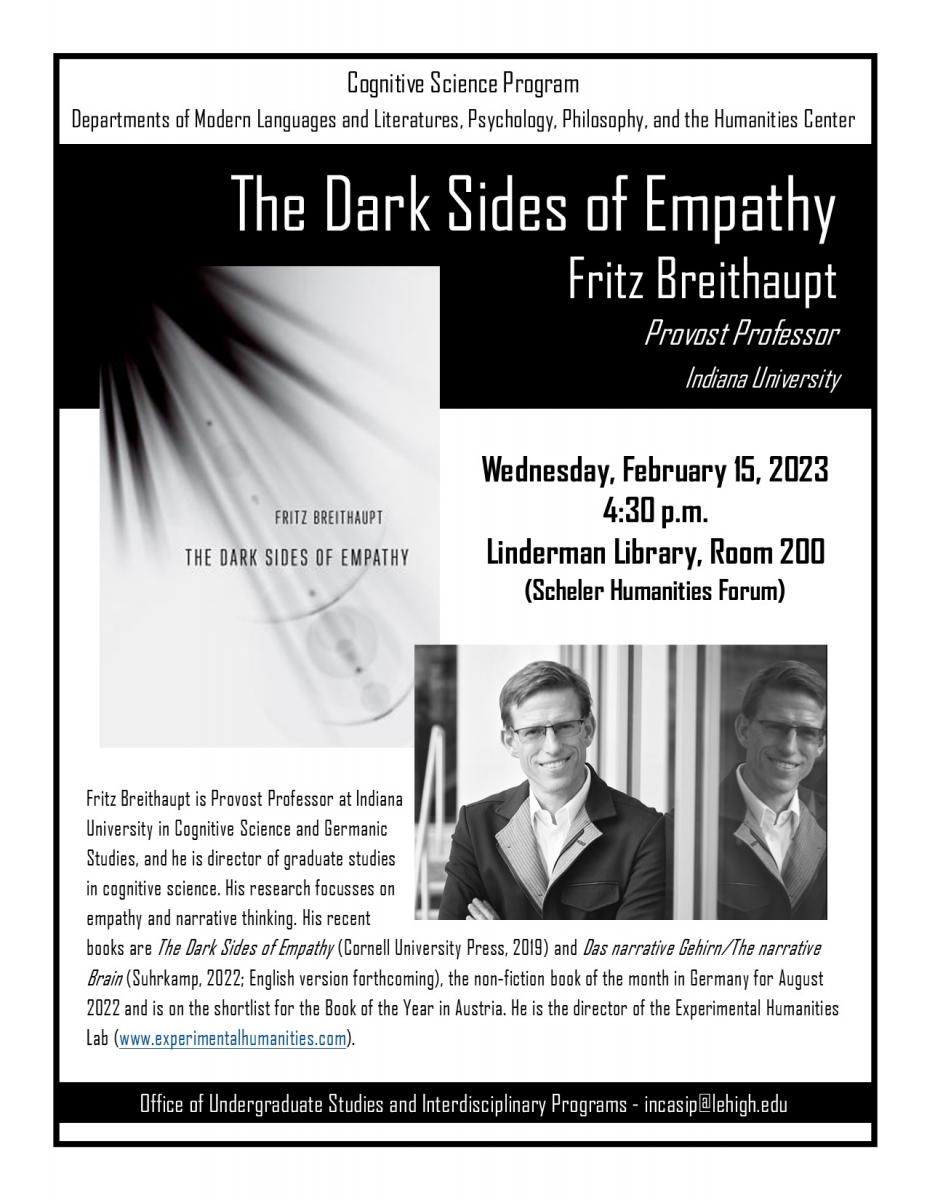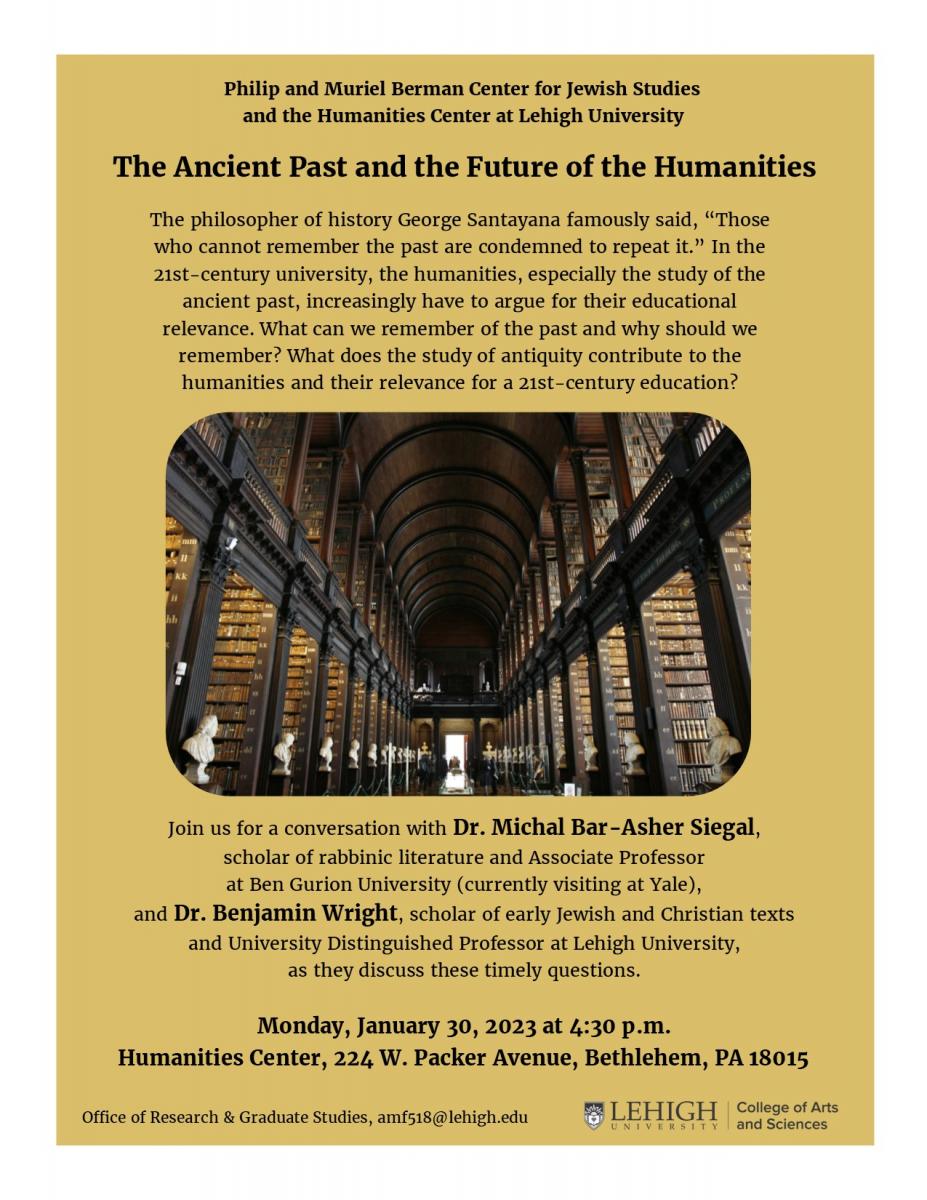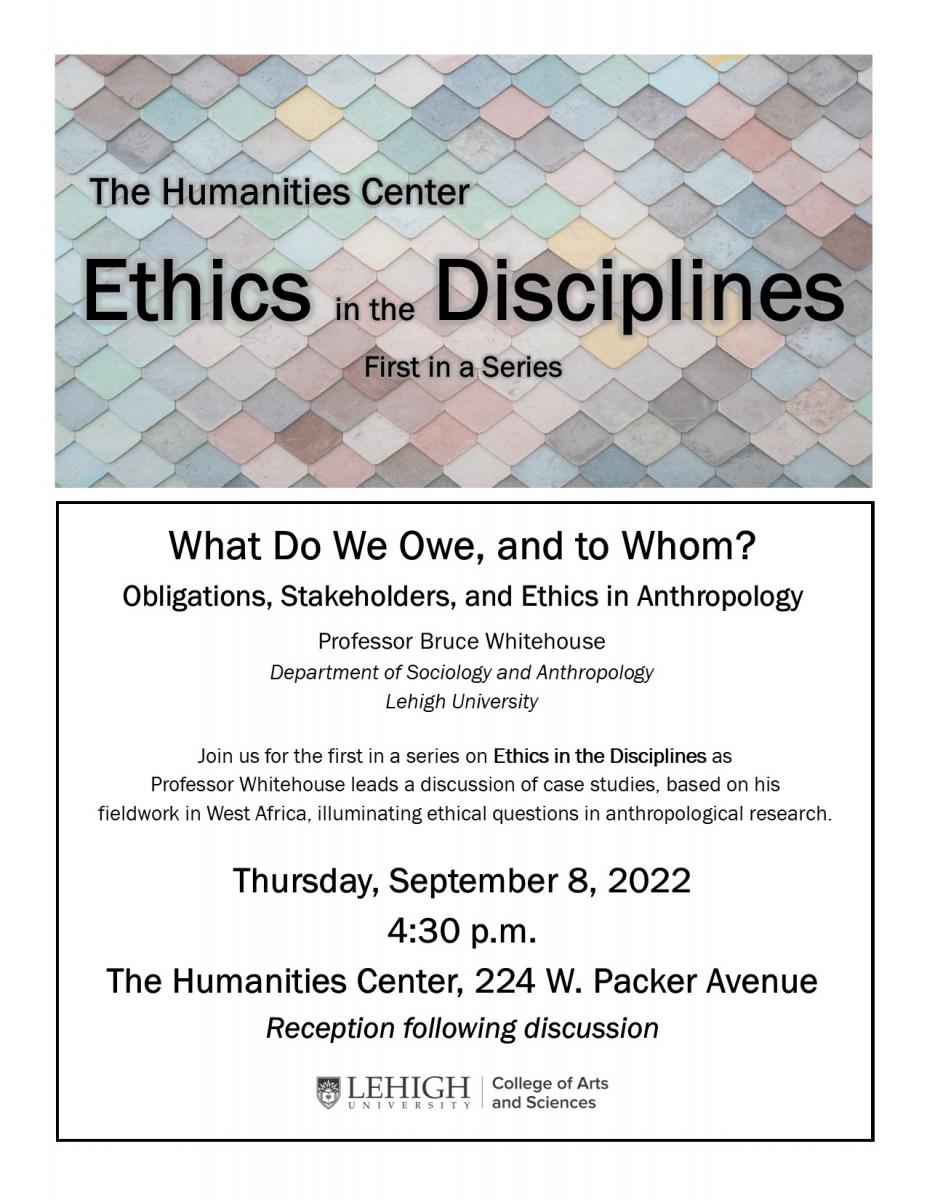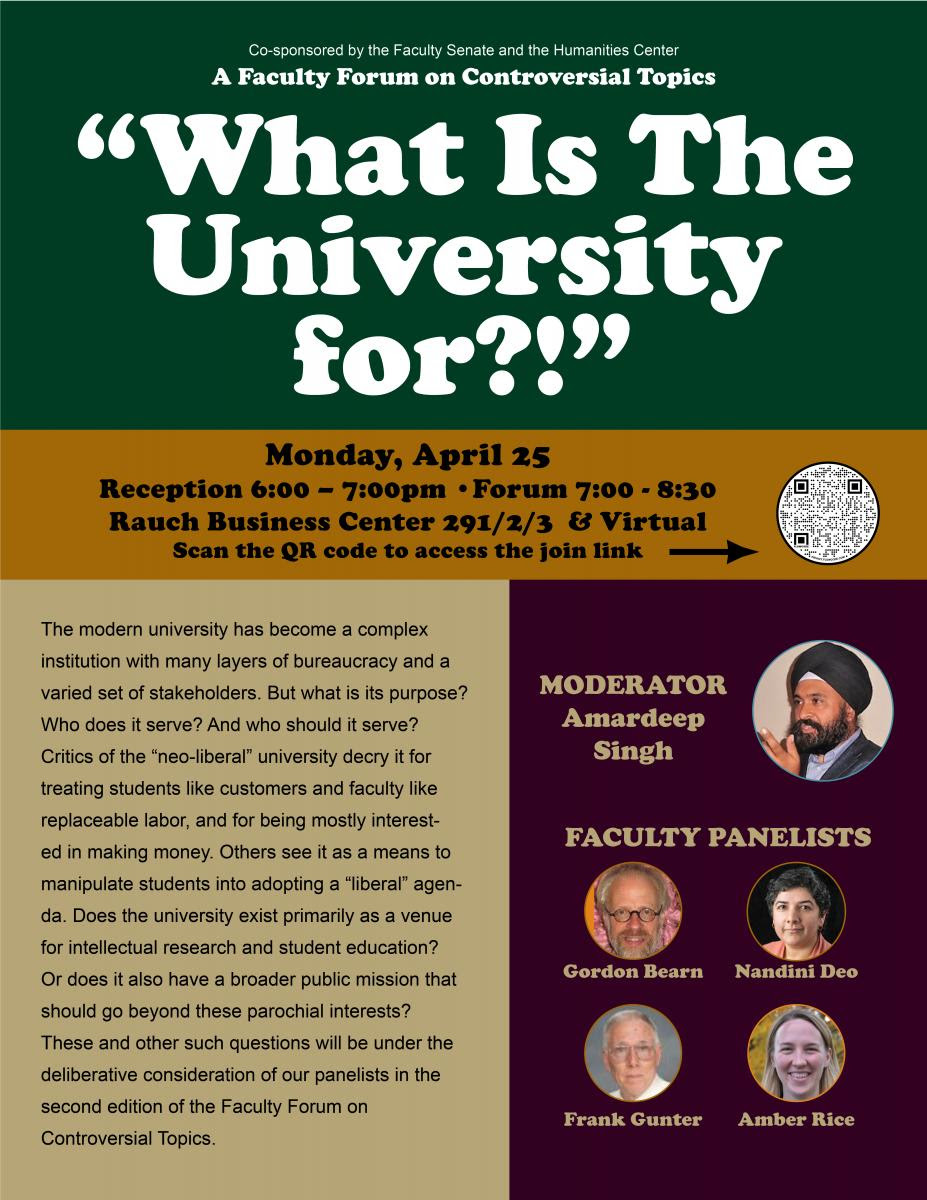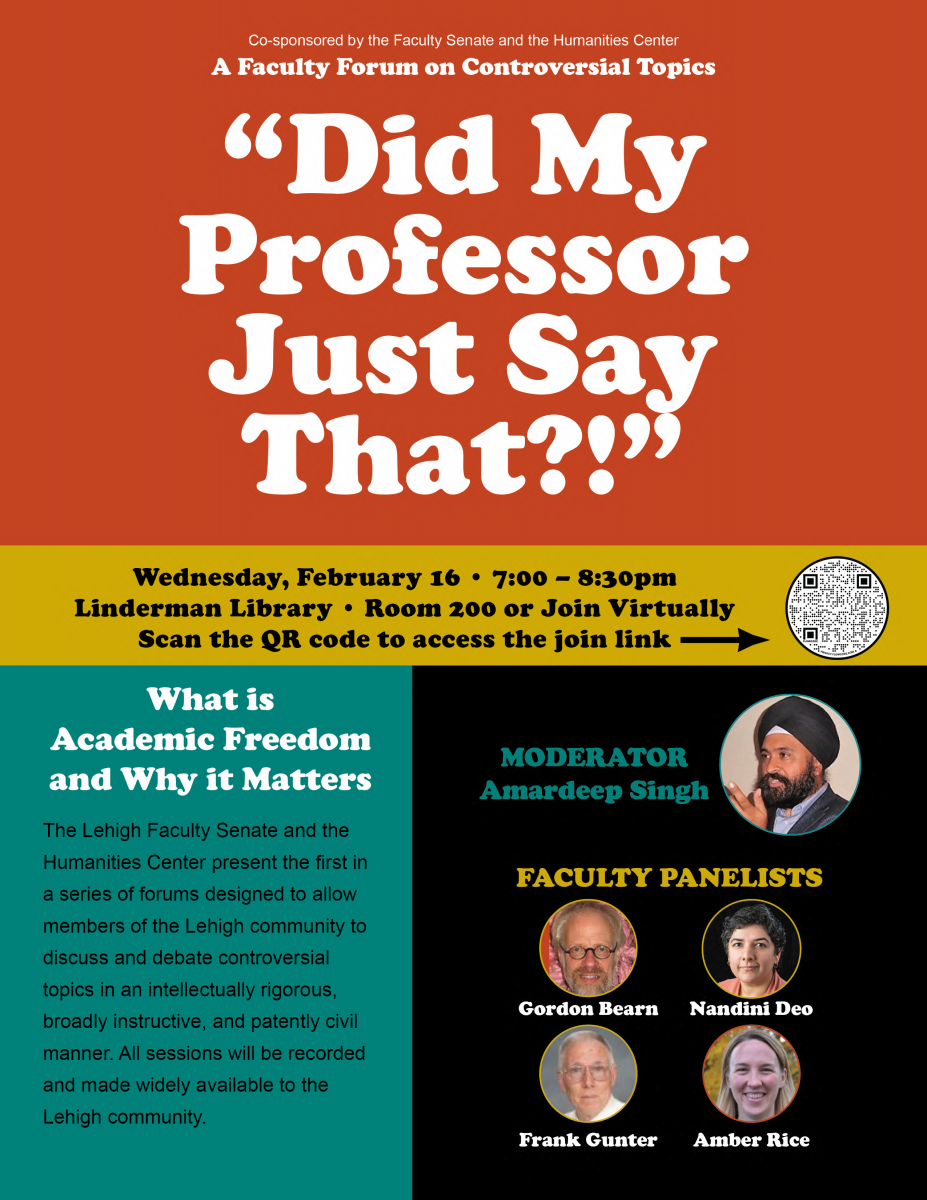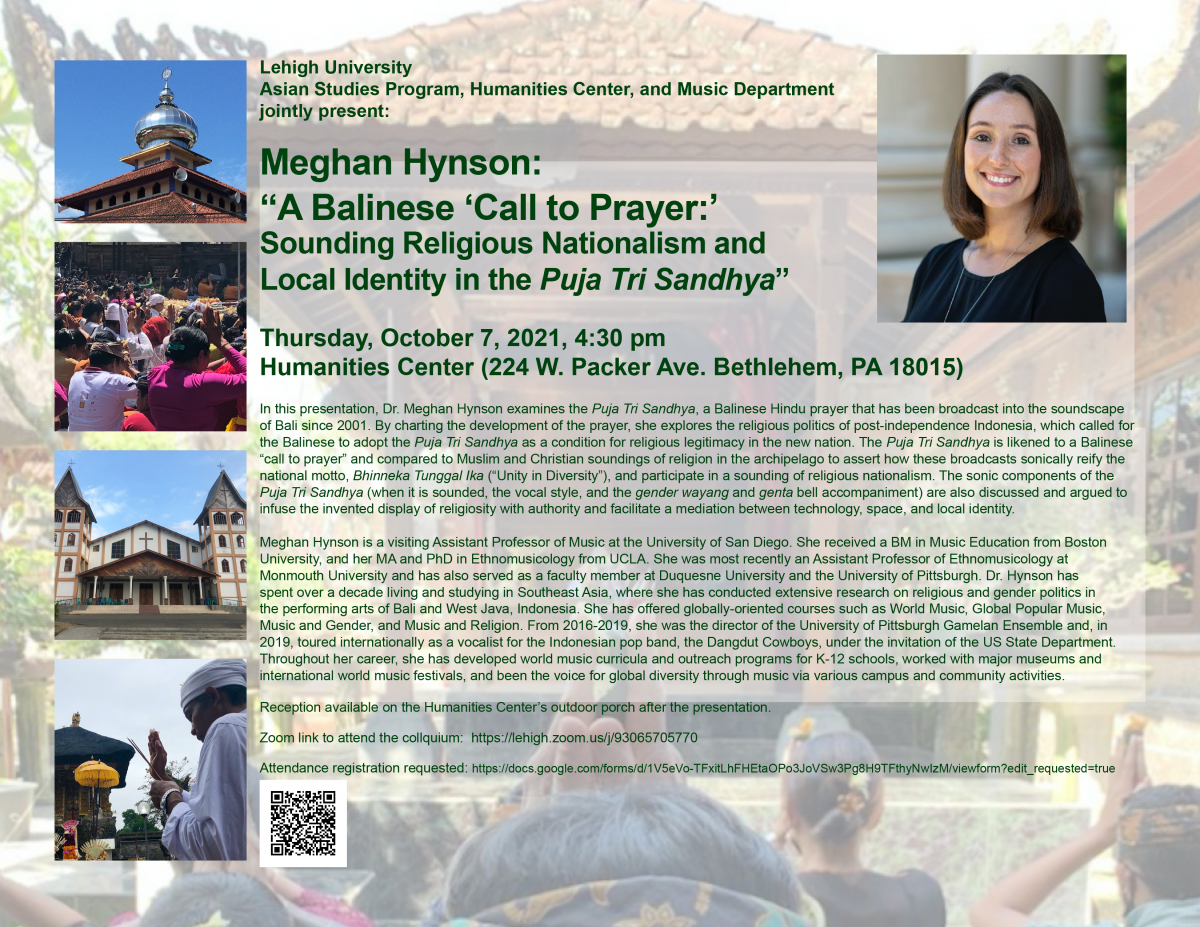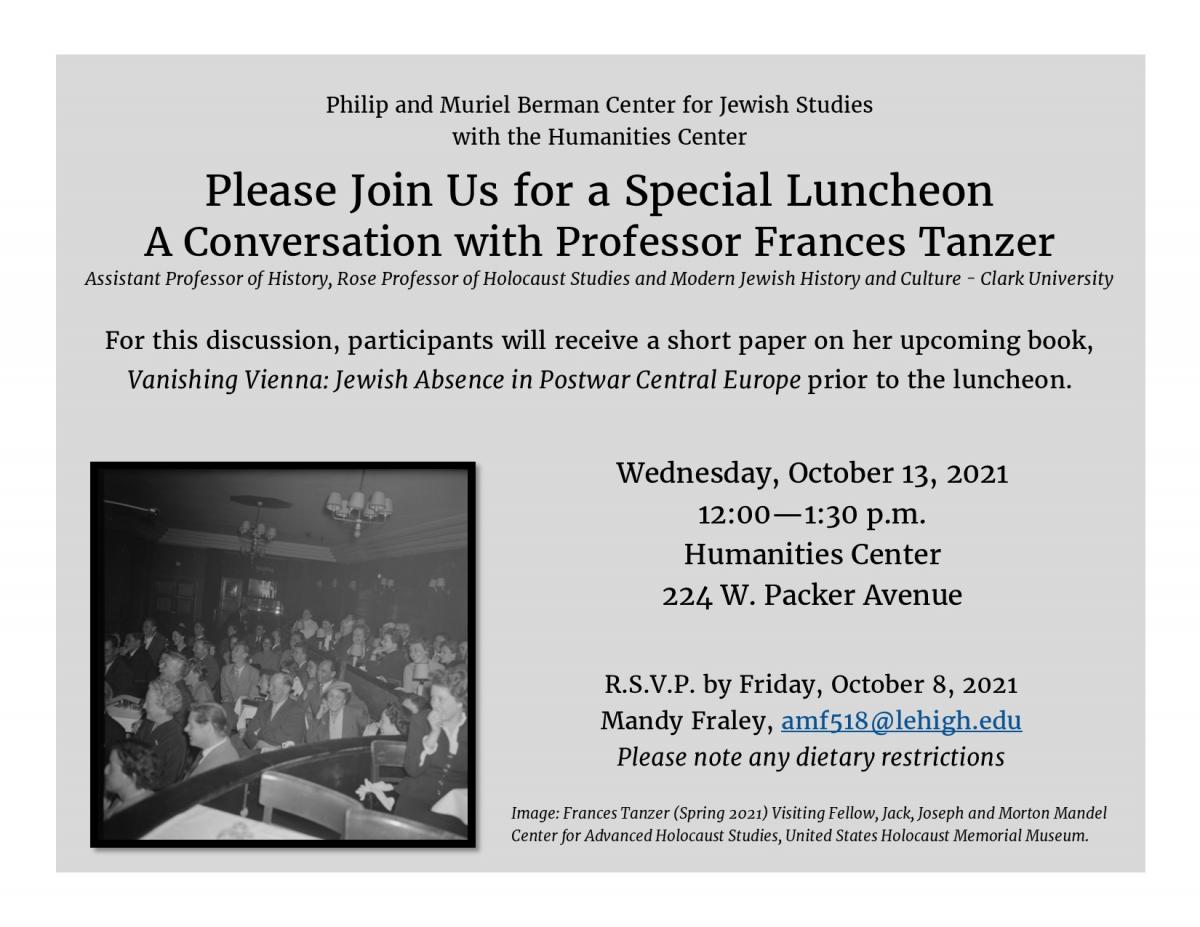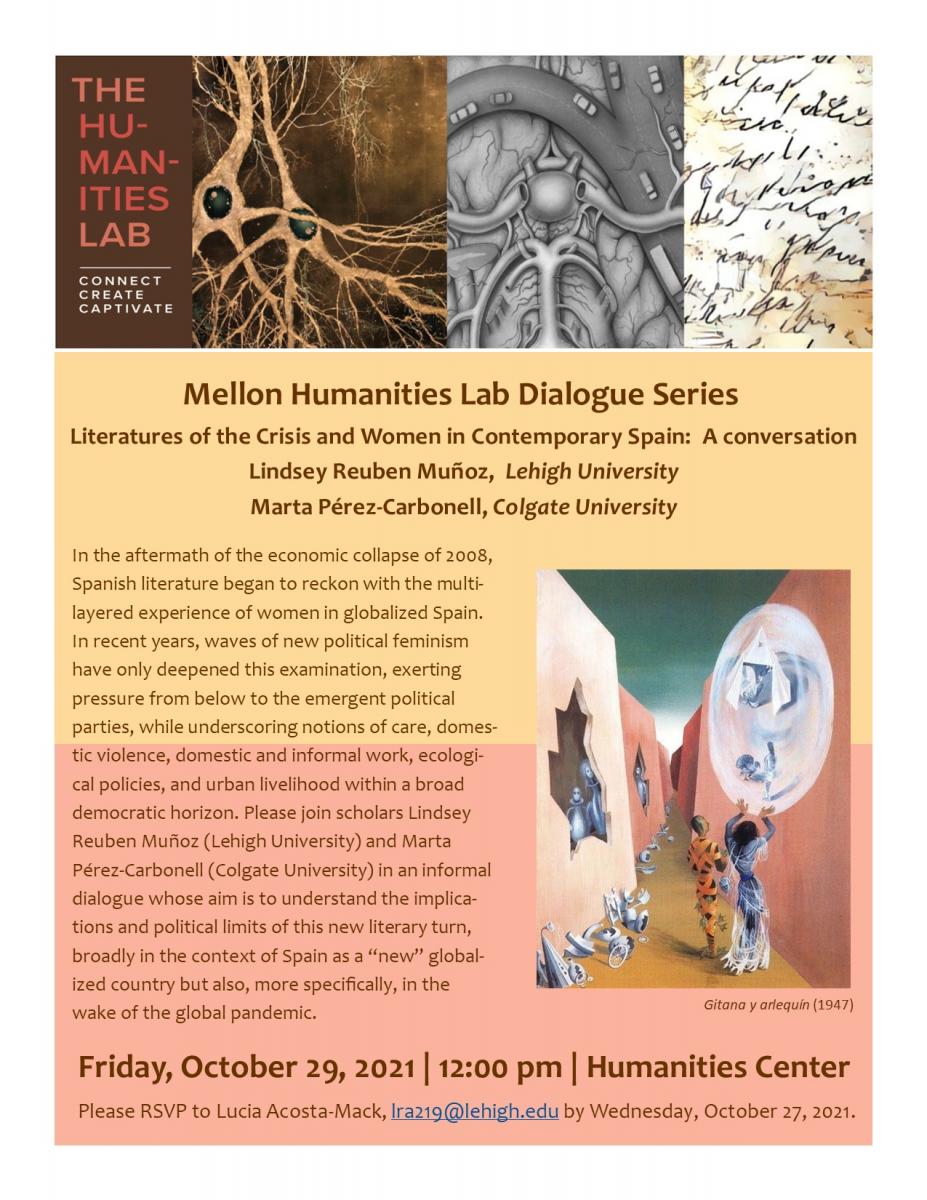2022-2023 Humanities Center Events
The Humanities Center
Ethics in the Disciplines: A Series
From Page to Stage: Exploring Ethical Issues in Contemporary Theater
Kashi Johnson
Chairperson and Professor, Department of Theatre
College of Arts and Sciences, Lehigh University
From concerns related to casting, production, and audience engagement, to the stories told and the messages conveyed, theater can be a powerful influence in our society. This talk will provide an in-depth look at the various dilemmas and ethical questions that arise in 21st century theatre making.
Reception following discussion.
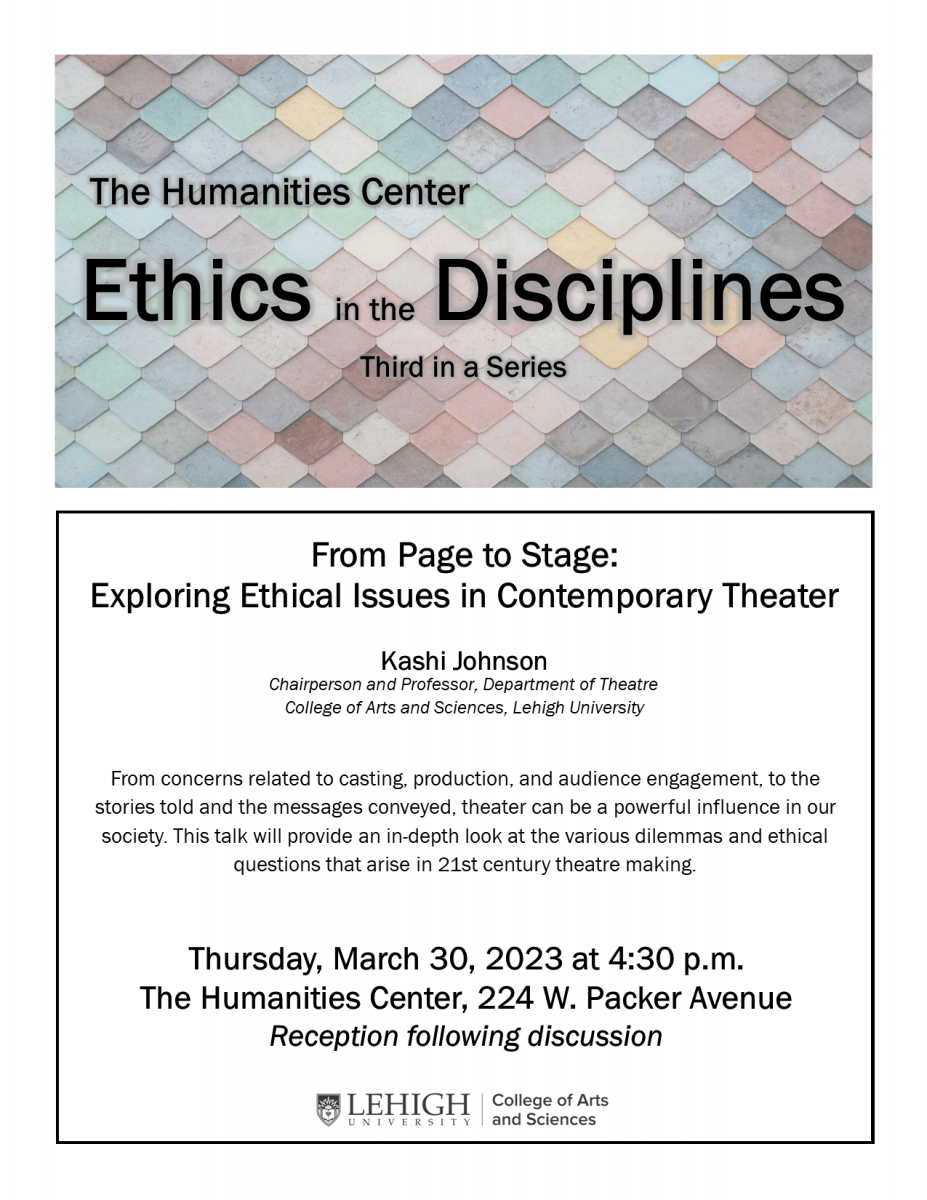
The Dark Sides of Empathy
Fritz Breithaupt
Provost Professor, Indiana University
Fritz Breithaupt is Provost Professor at Indiana University in Cognitive Science and Germanic Studies, and he is director of graduate studies in cognitive science. His research focusses on empathy and narrative thinking. His recent books are The Dark Sides of Empathy (Cornell University Press, 2019) and Das narrative Gehirn/The narrative Brain (Suhrkamp, 2022; English version forthcoming), the non-fiction book of the month in Germany for August 2022 and is on the shortlist for the Book of the Year in Austria. He is the director of the Experimental Humanities Lab (www.experimentalhumanities.com).
Wednesday, February 15, 2023
4:30pm
Linderman Library, Room 200 (Scheler Humanities Forum)
Cognitive Science Program
Co-sponsors: Departments of Modern Languages and Literatures, Psychology, Philosophy, and the Humanities Center
Philip and Muriel Berman Center for Jewish Studies and the Humanities Center at Lehigh University
The Ancient Past and the Future of the Humanities
The philosopher of history George Santayana famously said, “Those who cannot remember the past are condemned to repeat it.” In the 21st-century university, the humanities, especially the study of the ancient past, increasingly have to argue for their educational relevance. What can we remember of the past and why should we remember? What does the study of antiquity contribute to the humanities and their relevance for a 21st-century education?
Join us for a conversation with Dr. Michal Bar-Asher Siegal, scholar of rabbinic literature and Associate Professor at Ben Gurion University (currently visiting at Yale), and Dr. Benjamin Wright, scholar of early Jewish and Christian texts and University Distinguished Professor at Lehigh University, as they discuss these timely questions.
Monday, January 30, 2023
4:30am
Humanities Center, 224 W. Packer Avenue
The Humanities Center
Ethics in the Disciplines: A Series
Unknowingly Amoral Algorithms
Thomas McAndrew
Assistant Professor
College of Health, Lehigh University
Join us for the second in a series on Ethics in the Disciplines as Professor McAndrew will explore how past algorithms may have generated potentially inequitable solutions to queries that have shaped our lives. We will explore past work studying gender stereotypes portrayed on Google images, how targeted advertising algorithms may have lead to discrimination, and the potential use of health-care algorithms that are racially biased.
Reception following discussion.
Thursday, November 17, 2022
4:30 p.m.
The Humanitities Center, 224 W. Packer Avenue
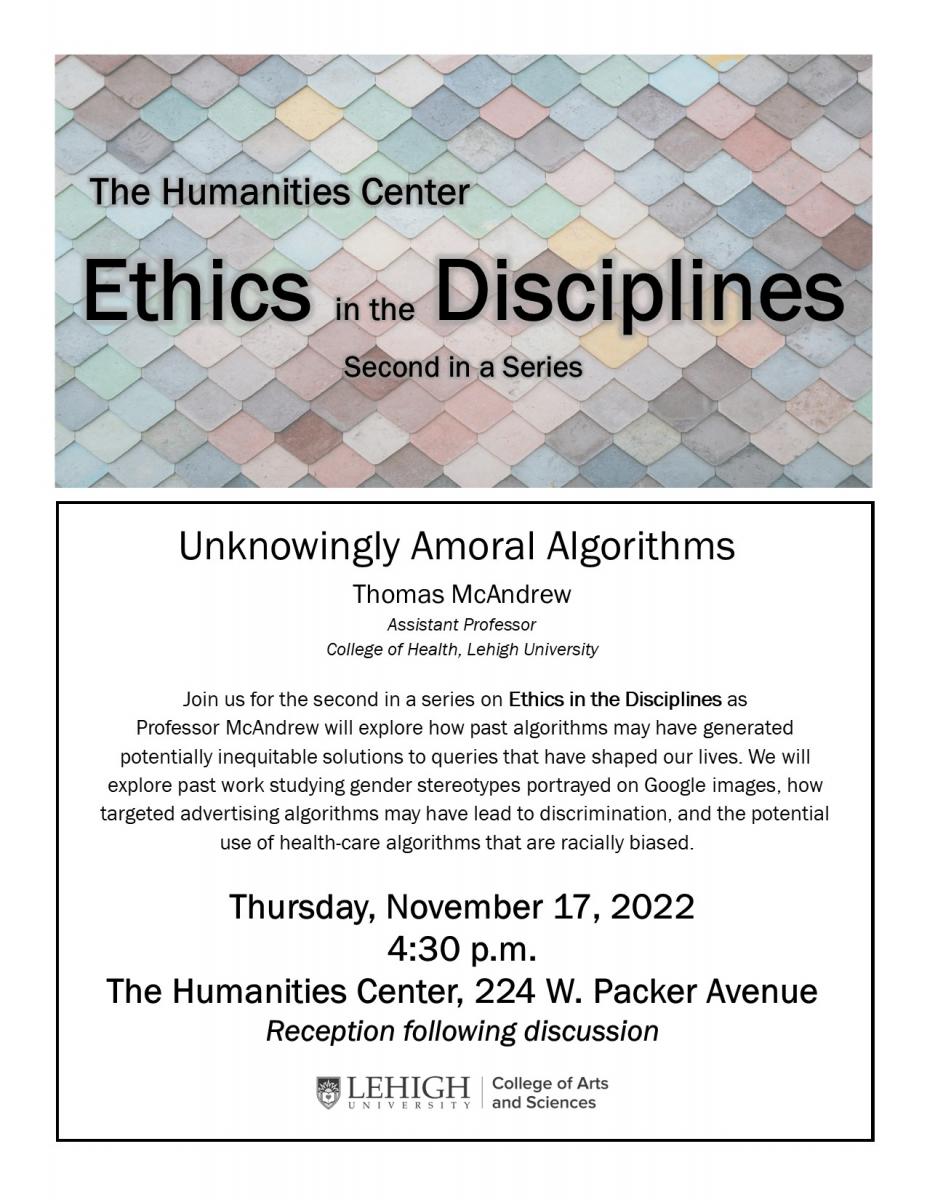
What Do We Owe, and to Whom? Obligations,Stakeholders, and Ethics in Anthropology
Professor Bruce Whitehouse
Department of Sociology and Anthropology
Lehigh University
Join us for the first in a series on Ethics in the Disciplines as Professor Whitehouse leads a discussion of case studies, based on his fieldwork in West Africa, illuminating ethical questions in anthropological research.Reception following discussion.
Thursday, September 8, 2022
4:30 p.m.
The Humanitities Center, 224 W. Packer Avenue
2021-2022 Humanities Center Events
LU Faculty Senate and the Humanities CenterA Faculty Forum on Controversial Topics #2
What Is the University For?
The modern university has become a complex institution with many layers of bureaucracy and a varied set of stakeholders. But what is its purpose? Who does it serve? And who should it serve? Critics of the “neo-liberal” university decry it for treating students like customers and faculty like replaceable labor, and for being mostly interested in making money. Others see it as a means to manipulate students into adopting a “liberal” agenda. Does the university exist primarily as a venue for intellectual research and student education? Or does it also have a broader public mission that should go beyond these parochial interests? These and other such questions will be under the deliberative consideration of our panelists in the second edition of the Faculty Forum on Controversial Topics.
Moderator: Amardeep Singh
Faculty Panelists: Gordon Bearn, Nandini Deo, Frank Gunter, and Amber Rice
Monday, April 25, 2022
7:00 to 8:30pm (Pre-event Reception 6:00 to 7:00pm)
LU Faculty Senate and the Humanities Center
A Faculty Forum on Controversial Topics #1
"Did My Professor Just Say That?!"
What is Academic Freedom and Why it Matters
The Lehigh Faculty Senate and the Humanities Center present the first in a series of forums designed to allow members of the Lehigh community to discuss and debate controversial topics in an intellectually rigorous, broadly instructive, and patently civil manner. All sessions will be recorded and made widely available to the Lehigh Community.
Moderator: Amardeep Singh
Faculty Panelists: Gordon Bearn, Nandini Deo, Frank Gunter, and Amber Rice
Wednesday, February 16, 2022
7:00 to 8:30pm
Linderman Library, Room 200 or Virtual
Meghan Hynson, colloquium: "A Balinese "Call to Prayer": Sounding Religious Nationalism and Local Identity in the Puja Tri Sandhya"
Reception available on the Humanities Center's outdoor porch after the presentation.
Thursday, October 7, 2021
4:30 p.m.
Humanities Center
224 W. Packer Avenue
In this presentation, Prof. Hynson examines the Puja Tri Sandhya, a Balinese Hindu prayer that has been broadcast into the soundscape of Bali since 2001. By charting the development of the prayer, she explores the religious politics of post-independence Indonesia, which called for the Balinese to adopt the Puja Tri Sandhya as a condition for religious legitimacy in the new nation. The Puja Tri Sandhya is likened to a Balinese “call to prayer” and compared to Muslim and Christian soundings of religion in the archipelago to assert how these broadcasts sonically reify the national motto, Bhinneka Tunggal Ika (“Unity in Diversity”), and participate in a sounding of religious nationalism. The sonic components of the Puja Tri Sandhya (when it is sounded, the vocal style, and the gender wayangand genta bell accompaniment) are also discussed and argued to infuse the invented display of religiosity with authority and facilitate a mediation between technology, space, and local identity. Meghan Hynson is a visiting assistant professor of music at the University of San Diego. She received a BM in Music Education from Boston University, and her MA and PhD in Ethnomusicology from UCLA. She was most recently an assistant professor of ethnomusicology at Monmouth University and has also served as a faculty member at Duquesne University and the University of Pittsburgh. Dr. Hynson has spent over a decade living and studying in Southeast Asia, where she has conducted extensive research on religious and gender politics in the performing arts of Bali and West Java, Indonesia. She has offered globally-oriented courses such as World Music, Global Popular Music, Music and Gender, and Music and Religion. From 2016-2019, she was the director of the University of Pittsburgh Gamelan Ensemble and, in 2019, toured internationally as a vocalist for the Indonesian pop band, the Dangdut Cowboys, under the invitation of the US State Department. Throughout her career, she has developed world music curricula and outreach programs for K-12 schools, worked with major museums and international world music festivals, and been the voice for global diversity through music via various campus and community activities.
Meghan Hynson, PhD, is Visiting Assistant Professor of Music at the University of San Diego.
A Music Department, Asian Studies and Humanities Center Collaboration
Event will be held in the Humanities Center.
Philip and Muriel Berman Center for Jewish Studies with the Humanities Center
Please Join Us for a Special Luncheon: A Conversation with Professor Frances Tanzer
Assistant Professor of History, Rose Professor of Holocaust Studies and Modern Jewish History and Culture - Clark University
For this discussion, participants will receive a short paper on her upcoming book, Vanishing Vienna: Jewish Absence in Postwar Central Europe prior to the luncheon.
Wednesday, October 13, 2021
12:00—1:30 p.m.
Humanities Center
224 W. Packer Avenue
R.S.V.P. by Friday, October 8, 2021
Please note any dietary restrictions
Image: Frances Tanzer (Spring 2021) Visiting Fellow, Jack, Joseph and Morton Mandel Center for Advanced Holocaust Studies, United States Holocaust Memorial Museum.
Mellon Humanities Lab Dialogue Series
Literatures of the Crisis and Women in Contemporary Spain: A conversation
Friday, October 29, 2021 - 12:00pm
- Humanities Center
Lindsey Reuben Muñoz, Lehigh University and Marta Pérez-Carbonell, Colgate University
In the aftermath of the economic collapse of 2008, Spanish literature began to reckon with the multi-layered experience of women in globalized Spain. In recent years, waves of new political feminism have only deepened this examination, exerting pressure from below to the emergent political parties, while underscoring notions of care, domestic violence, domestic and informal work, ecological policies, and urban livelihood within a broad democratic horizon. Please join scholars Lindsey Reuben Muñoz (Lehigh University) and Marta Pérez-Carbonell (Colgate University) in an informal dialogue whose aim is to understand the implications and political limits of this new literary turn, broadly in the context of Spain as a “new” globalized country but also, more specifically, in the wake of the global pandemic.
2020-2021 Humanities Center Events
WINTER 2021
VIRTUAL EVENT: Registration Required https://go.lehigh.edu/bookclub
Once registered, you will be emailed a ZOOM Link.
The Humanities Center Book Club in January 2021for Undergraduates and their Families!
Wednesdays - January 13, 20, 27 | 4:30-5:30 p.m.
The Humanities Center will host a book club in January 2021 on Emily St. John Mandel's Station Eleven, a novel about how the arts and humanities sustain community in the aftermath of a devastating pandemic. It's a fantastic book, particularly relevant to our present moment. We invite any interested Lehigh undergraduates to join, either on their own or with a family member. Students and their families will need to purchase their own copies of the book, but the book club itself will be free. Sessions of 10-12 participants will be facilitated by Lehigh humanities faculty and graduate students. In addition, the Humanities Lab will host a panel--open to the community--on arts and humanities perspectives on pandemics. Please use this link to register: https://go.lehigh.edu/bookclub Once registered, you will be emailed a ZOOM Link.
Book Synopsis
Set in the days of civilization's collapse, Station Eleven tells the story of a Hollywood star, his would-be savior, and a nomadic group of actors roaming the scattered outposts of the Great Lakes region, risking everything for art and humanity.
One snowy night a famous Hollywood actor slumps over and dies onstage during a production of King Lear. Hours later, the world as we know it begins to dissolve. Moving back and forth in time—from the actor's early days as a film star to fifteen years in the future, when a theater troupe known as the Traveling Symphony roams the wasteland of what remains—this suspenseful, elegiac, spellbinding novel charts the strange twists of fate that connect five people: the actor, the man who tried to save him, the actor's first wife, his oldest friend, and a young actress with the Traveling Symphony, caught in the crosshairs of a dangerous self-proclaimed prophet.
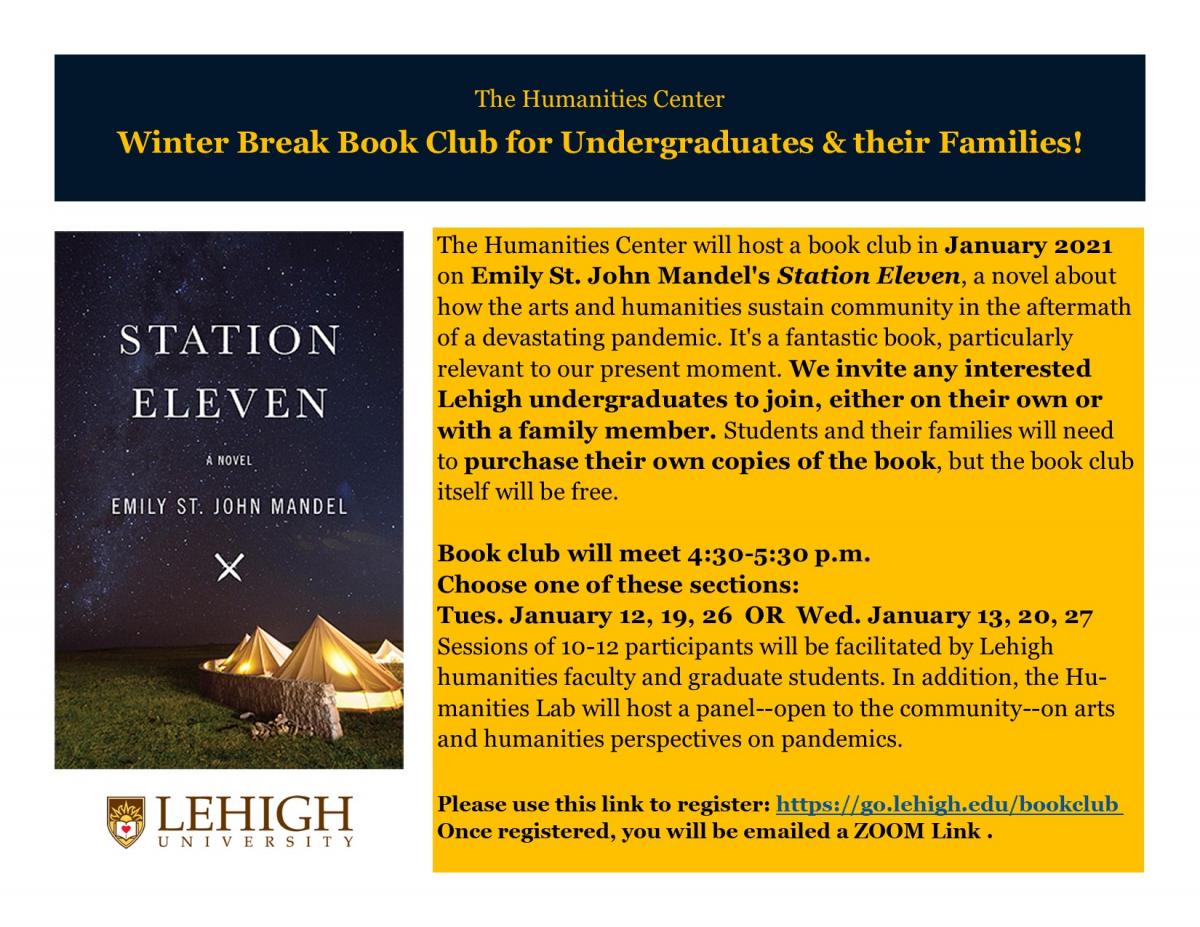
Humanities Center Lunchtime Salon: Race, Caste and the State
The Humanities Center invites interested parties to participate in a lunchtime discussion of sections of Isabel Wilkerson’s new book, Caste: The Origins of Our Discontents (2020). The salon will be held Friday, November 20, from 12:00-1:30PM.
This will be the first of a two-part series of events around the theme of systemic racism and the state. Our second event will be held during the Spring 2021 semester.
Facilitated by Emily Pope-Obeda (History) and John Vilanova (Journalism & Communication/Africana Studies), the sessions will engage with structures such as policy, labor, and citizenship in the active making and codification of race, specifically discussing the ways racial others have been constructed. Participants will be invited to read selections from the book and come prepared to discuss them. We hope to create a discussion-centric space where faculty from a wide range of disciplines can bring their insights to the conversation.
Caste: The Origins of Our Discontents is a major new work of cultural studies produced by Wilkerson, who won the Pulitzer Prize in 1994 and published The Warmth of Other Suns: The Epic Story of America's Great Migration (2010) to similar acclaim. Caste, which has garnered wide attention, offers incisive and important new ways of theorizing race (and anti-Black racism specifically) in America.
Please register here for the Nov 20th discussion. Once you register, we will send you the pdf of the readings. This event is open to all university community members who are interested.
VIRTUAL EVENT: https://lehigh.zoom.us/j/7957428965#success
W.E.B. Du Bois and the Origins of Public Humanities
Roopika Risam, Associate Professor at Salem State University
Author of "New Digital Worlds: Postcolonial Digital Humanities in Theory, Praxis, and Pedagogy"
Thursday, October 29 | 12:10-1:25 p.m.
Sponsored by the Mellon Humanities Lab
2019-2020 Humanities Center Events
January 21 | February 18 | March 17 | April 21 | May 19 | June 16
Sponsored by: Bradbury-Sullivan LGBT Community Center, Lehigh University’s Humanities Center, and South Side Initiative
Facilitated by Professor Mary C. Foltz, Associate Professor, English Department, Lehigh University
The community reading group invites you to join us to discuss an award-nominated LGBTQ memoir each month. Our conversations allow us to reflect upon major topics in LGBTQ communities, discuss our own experiences as they connect or diverge from the memoir, and engage with impactful books that are starting national discussions. Books are provided free of cost to the first ten people to sign up with Kathleen Kapila,
kathleen@bradburysullivancenter.org!
This group will meet from 6:30-8:00 p.m. at the Bradbury-Sullivan LGBT Community Center, 522 West Maple Street, Allentown, PA 18101.
March 5 | 4:30 p.m. | Linderman Library, Scheler Humanities Forum, Room 200
Trans*Archives
Jack Halberstam, Professor of English and Gender Studies, Columbia University
In his brilliant, humorous and whimsical parody of a Smithsonian book titled American History in 101 Objects, artist Chris E. Vargas, in 2015, invited visitors into his imaginary Museum of Transgender Hirstory to see a show titled Transgender Hirstory in 99 Objects. Riffing on the self-importance of the Smithsonian title, the precision of its 101 objects and its investment in the notion of authentic history in the first place, Vargas called attention to the way that a history of gender variance will necessarily fall by the wayside in any canonical account of American history and will require its own object lessons. The objects that collectively tell the story of gender variance are counter-intuitive and suggestive, risqué and emblematic. For Vargas’s show, the objects ranged from queer banners by Tuesday Smilie to sculptures of hybrid creatures and photographic records of transgender lives gone by. What Transgender Hirstory in 99 Objects made clear, however, was that trans* histories, which have been narrated as a record of pathology, dysphoria and trouble need their own archive in order to remove themselves from the medical history of disorder. This talk offers its own version of trans* history through a series of objects and archives ranging from photo albums to films, paintings and performances.
March 17 | 4:30 - 6:00 p.m. | Bethlehem Area Public Library, Southside Branch
A free, public discussion about economic and environmental insecurity.
Why do so many working families feel uncertain about our jobs, income, and basic life necessities? How do today's employers shift the burden of risk onto their employees? What impact does this have? And more importantly: what can we do about it?
Light Refreshments Provided
Tackling T.I.N.A. Imagining Economic Alternatives
Sponsored by:
Humanities Center, Lehigh University
*Center for Ethics, Lehigh University
BETHLEHEM AREA PUBLIC LIBRARY Leaniing Starts Here
* The Center for Ethics is funded in part by the ENDOWMENT FUND for the TEACHING of ETHICAL DECISION-MAKING.
FREE FOOD!
Co-sponsor: Africana Studies (NEH)
May 1 | 12:00 p.m. Humanities Center (Online)
"Democracy and Truth" Seminar
Hosted by William Bulman and Nitzan Lebovic, Lehigh University
February 27 | 4:30 p.m. | Chandler Ullmann Hall, Room 216
Patrick Inglis, Assistant Professor of Sociology, Grinnell College
Department of Sociology and Anthropology, Asian Studies, Humanities Center and Global Studies
Fall 2019
Humanities Center Antibiotic Resistance Seminar with the Office of the Vice President for Research and Graduate Studies
November 4 | 6:00 p.m. | STEPS 280
The Anthropocene in/of the Cell: Antibiotic Resistance and the History of Industrialization
Hannah Landecker, Department of Sociology and Director, Institue for Society and Genetics, UCLA
Lorenzo Servitje, Moderator, Assistant Professor of English, Lehigh University
The Anthropocene, being a concept that comes to us from geology and climate science, is generally seen in relation to material evidence gathered from the rock strata, marine sediments, and glacier ice. It is a concept of macro scales, carbon economies, epochs and world systems. This talk goes small instead, and reads biological and biochemical narratives to examine the idea of an Anthropocene in, or of, the cell. Drawing on specific examples of the industrial production of pharmaceuticals and pesticides, I show how microbial cells have changed to adapt to the biochemical environments generated during and after World War II by a growing chemical industry, shifts in medical protocols, and changing hygiene practices. Rather than the organism in sediment during historical time, I consider the organism as sedimentation of historical time: a repository of metabolic strategies for navigating novel chemical milieu after industrialization. From this perspective, the insides of cells can be seen as microscopic landscapes in their own right, in which the products of industrialization alter the biophysical and architectural character of molecular life, affecting the flow of mobile genetic elements, the dynamics of microbial community life, and the very nature of human-microbe relationships.

